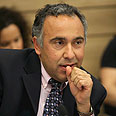
Government to install performance-based compensation scheme
Dedicated software will calculate annual bonuses of government employees based not only on output but also on effective results and long-term implementation
The civil service is heading towards a compensation reform – Calcalist learned that within six months, government employees will be evaluated and compensated not only according to output but also on the basis of effective results and long term implementation.
The Knesset's Financial Affairs Committee is slated to give the go ahead for the funding of the plan which was submitted by Eyal Gabai during his term as Director General at the Prime Minister's office.
According to the plan, the new system is based on another system which has been in use used at the Ministry of Industry, Trade and Labor in the past year for the management of governmental work programs.
Until now, pay was based on output alone and government overall-goals were either left un- assessed or employees were not compensated for performance related to such goals.
For example, the Ministry of Industry, Trade and Labor employees who dealt with bringing foreign investments into Israel would set their own goals insofar as the number of meetings held with foreign investors or overseas delegations and would receive a 20% compensation premium per year for their output but not for the number of investors who in effect invested in Israel due to their efforts.
According to the new pay scheme, the premium will remain unchanged; however, its composition will be changed to reflect effective results.
Three compensation classes
The weight that the program attributes to performance varies among the government departments; the realization of less than 50% of an employee's work plan will not entitle him to any bonus; the realization of 50% and more of an employee's work plan will entitle him to a small bonus; Maximal compensation depends on the realization of 90% and more of the employee's objectives. Heads of divisions and offices will have to assign importance levels to each task – low, medium and high.
Head of strategy and planning at the Ministry of Industry, Trade and Labor, Michal Fink who lead the development of the system, told Calcalist that "we felt there was a problem in the effectiveness of the government's work. Even when tasks were carried out efficiently they were not necessarily carried out in the most effective manner. We don’t only want workers to do more, we want them to do it right and meet quantitative goals in effect".
Fink added that "the computerized system is a tool that presents the work programs such that they don’t look like just a list of tasks. The approach will emphasize outcomes and define how we derive our operations from the tasks at hand rather than taking the tasks that are on the table and carrying them out in a simplistic way, aiming at objective implementation-based performance. Often the government carries out planning but does not always implement plans correctly or even follows up on the implementation thereof."
The system aims to solve a prevalent problem in government offices as well – insufficient coordination and cooperation among the offices and even among sub-divisions at the same office.
When the need arises for an inter-ministerial team or for a number of teams in the same office, the program can be used to delineate a consolidated work plan, i.e. a scheme that outlines office-based tasks at the level of inter-ministerial cooperation.
For example, a decision to establish a technology center at the Negev calls for cooperation between the Chief Scientist's office, the Regional Development Center and additional bodies and the system can assign tasks to each of the project's units and define the interfaces between them.
Furthermore, the system can perform cost-benefit analyses and enable internal units which provide services, such as the legal bureau, the information system department, research and economics and so forth, to receive assignments from the various office units and prioritize them according to cost, importance and meeting criteria.
One pilot after another
As revealed previously by Calcalist, this initiative is part of a project which has been promoted by the wage unit aiming to award civil service workers with monthly bonuses based on client evaluation of their performance.
Each employee may earn a monthly bonus worth hundreds and even thousands of shekels which will be calculated on a quarterly basis. Plans are to extend the pilot to the Population Administration, the Foreign Trade Administration, the Veterinarian Services, the Trade Institute and even to the employees of the disputable biometric pilot.
Tomer Avital contributed to the report
Click here to read this article in Hebrew
- Follow Ynenews on Facebook










